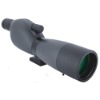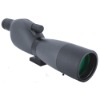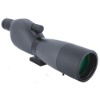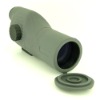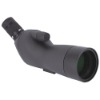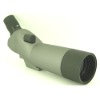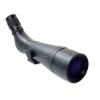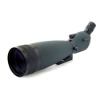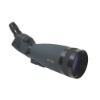
Detailed Product Description
JF15-45x60 spotting scope:
| MODEL | JF15-45X60 |
| POWER | 15x-45x |
| OBJECTIVE | Φ60 |
| F.O.V ANGLE | 2.2-1.1 |
| FIELD OF VIEW(m/1000m) | 38-20 |
| EXIT PUPIL (mm) | 4-1.4 |
| NEAR FOCUS (m) | 8 |
| EYE-RELIEF(mm) | 18-15 |
| WEIGHT g | 950 |
Features of JF15-45x60 spotting scope:
- 100% water proof
- Fully-multi coated
- Comes with small metal tripd
Spotting scope are small telescopes that perform well in full-light confiditions and are designed for observing birds,wildlife,or other terrestrial objects.
A spotting scope is a portable , optimized for the observation of terrestrial objects. The of a spotting scope is typically on the order of 20X to 60X. Other common features include:
- somewhat "rugged" or rubber-armoured design
- convenient mounting for attaching to a
- designed and located knob for focus control
- tethered elastomeric lens cap
- a range of eyepieces to give different magnifications, or a variable "zoom" eyepiece to give a range of magnifications (e.g. 20-60X)
The light gathering power of a spotting scope is determined by the width of the , typically between 55 and 80 mm. All else being equal, the larger the objective, the more heavy and expensive the telescope.
There are three types of scope: "straight-through" (the eyepiece is on the same axis as the body of the scope), "angled" (the is at an angle of about 45 degrees to the body of the scope), and, rarely, a more complex, shoulder-mounted design. Straight-through scopes are easier to use from inside a vehicle while angled scopes are more comfortable for tall people and more easily shared by people of different heights.
The choice of the eyepiece lens determines the overall magnification. The best magnification is decided by a number of factors. Magnifications of less than 20X are unusual, as (much cheaper and lighter) or can provide this. Magnifications of more than 60X lead to poorer brightness and, even on a tripod, shake can be a problem. The is also limited.
Usually for , but spotting scopes are popular when used in longrange hunting mounted on a lightweight hunting . 20X or 30X are favoured for birdwatching. 20x-60x variable powers are used for longrange hunting if combined with solid mounting platforms. This gives a good field of view and a bright image. Spotting scopes are also used on many target ranges to avoid walking to the target to verify the placement of hits.
Amongst the term "pole" is used as a shorthand expression meaning telescope. The related verb "to pole-off" therefore means reading some identification marks of an aeroplane by using a telescope. Other users might employ the same slang term.
Spotting scope manufacturers fall into several groups. At the top end of the market, it is generally accepted[] that three manufacturers compete strongly for the ultimate in quality: are the most expensive of all[], closely followed by , and .[] Several manufacturers produce scopes that are generally thought to be of almost equal quality to the top three, but at about half the price, among them , , and .[] is another Japanese company making low-price models.


